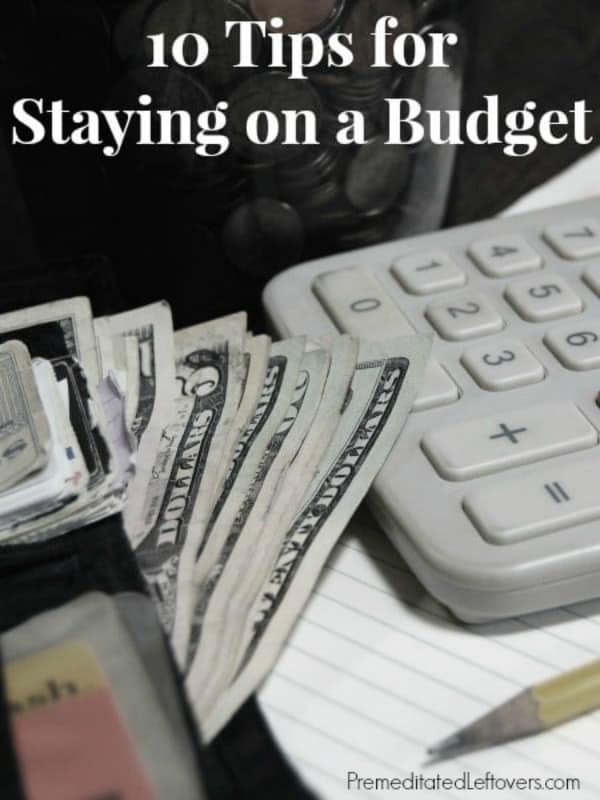Here are 10 tips for staying on a budget to help you get your finances under control and start building your personal savings.
A budget is a must-have for nearly every family. Knowing how much money you have to spend on each area of your life can help keep balance and help with stress levels. Not everyone can easily stay on a budget, but there are little things you can do to help keep your money going where it is supposed to go. Below are ten easy ways to help you get on track and stay there.
10 Tips for Staying on a Budget
1. Don’t spend what you don’t have. This seems simple, but sometimes is harder than you think. If you go to the store and buy a bunch of things you don’t need, you’re probably taking money out of an area that could have gone to pay a bill. If you don’t have the “extra” then don’t go to the store…then you won’t be tempted!
2. Make a list. Don’t go to the store without a list. You end up picking up a lot of things you don’t need simply because it catches your eye or looks tasty. Plan out your menu, write up a list and stick to it while you are at the store.
3. Shop with cash. It’s easy to pull out your debit card to make a purchase, but it’s harder to keep track of. If you have cash, you have to be careful you only spend what you have on hand. You will find that you are more conservative with your spending if you can only spend a certain amount.
4. Cut bad habits. It could be you like a beer or two, or smoke or even Starbucks in the morning. Take a look at those habits and try to put an end to the ones costing you money. If Starbucks is your obsession, cut down. If you stop at least three times a week and spend, say $4.50 each time, that’s about $55/month and $650 a year on….coffee!
5. Work as a team. If you are working on saving while your partner is out spending the extra, you are fighting a losing battle. You will never win the budget game if you can’t both be on the same page.
6. Pay extra towards your balances. You may not have enough to pay off a credit card but you can help to cut down the balance a lot quicker if you make extra payments and as early as possible. Many loans have a per day interest that you accumulate. If you make payments as quickly as possible, you may save a few dollars. If you pay your minimum balance, you will be paying for a long time. Add an extra $10, $20 or whatever you can to your payment to help cut down on the balance.
7. It’s okay to be flexible. Life happens. Things come up. Just because you fall off track and need to take money that *should* go to one bill or another is not a reason to fully give up. Be flexible and ready for things to come up, because something will always come up.
8. Keep track of your spending! You won’t know how much money you have to spend if you don’t know how much you’ve spent. I know, sometimes it’s easy to just pretend you didn’t make that extra stop at Bed, Bath and Beyond, but just because you are pretending it didn’t happen, doesn’t mean the money isn’t gone.
If you aren’t sure where you are wasting money, you might want to use a Budget Planner to track your spending. It will help you identify wasteful spending, where you can make realistic cuts in your budget, and identify money to direct to savings.
9. Analyze your receipts. Keep your receipts and look at them once a week/month to see where your money is going. You may realize you are spending more than you thought.
10. Give your basket one last look. Before you check out, give your basket one last look over to see if you really need everything you are buying. You might see an extra package of cookies or things like that you put in your basket, despite your list.
More Money Saving Tips
How to Get Your Budget Back on Track After Holiday Spending



Ashley Z. says
Great tips! Thanks for sharing! 🙂